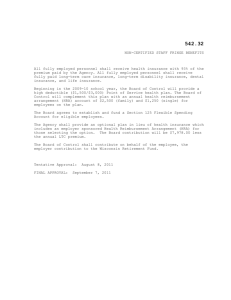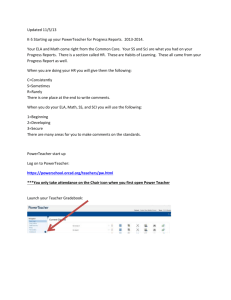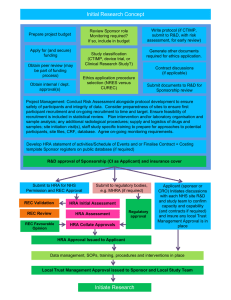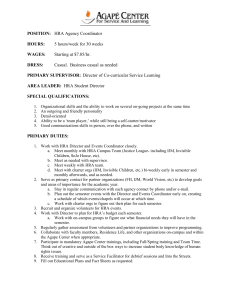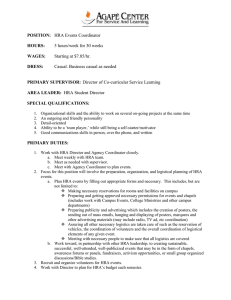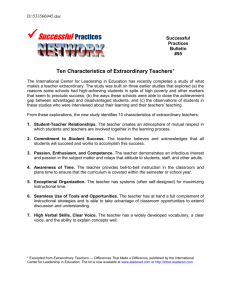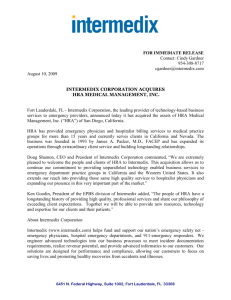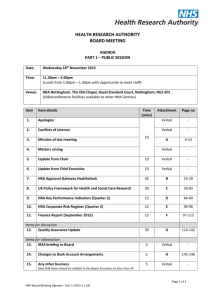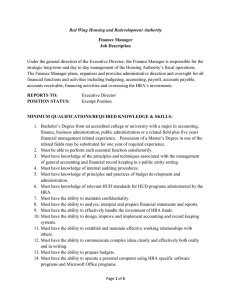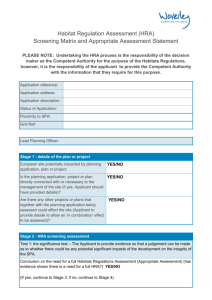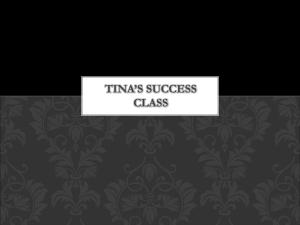April 2010
advertisement
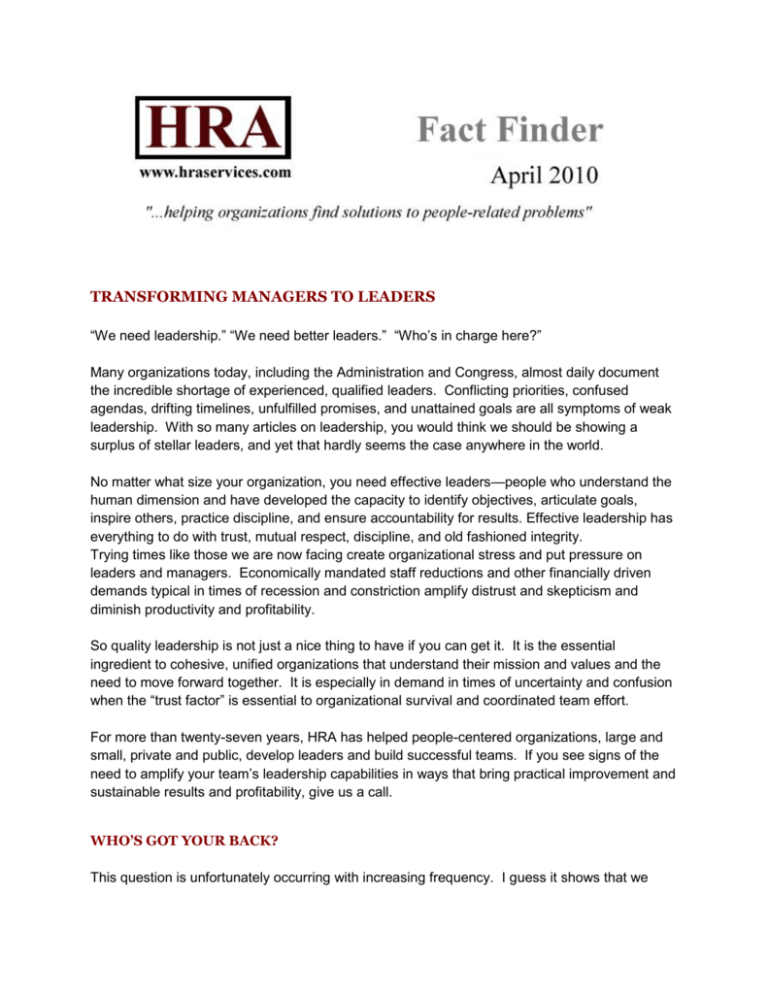
TRANSFORMING MANAGERS TO LEADERS “We need leadership.” “We need better leaders.” “Who’s in charge here?” Many organizations today, including the Administration and Congress, almost daily document the incredible shortage of experienced, qualified leaders. Conflicting priorities, confused agendas, drifting timelines, unfulfilled promises, and unattained goals are all symptoms of weak leadership. With so many articles on leadership, you would think we should be showing a surplus of stellar leaders, and yet that hardly seems the case anywhere in the world. No matter what size your organization, you need effective leaders—people who understand the human dimension and have developed the capacity to identify objectives, articulate goals, inspire others, practice discipline, and ensure accountability for results. Effective leadership has everything to do with trust, mutual respect, discipline, and old fashioned integrity. Trying times like those we are now facing create organizational stress and put pressure on leaders and managers. Economically mandated staff reductions and other financially driven demands typical in times of recession and constriction amplify distrust and skepticism and diminish productivity and profitability. So quality leadership is not just a nice thing to have if you can get it. It is the essential ingredient to cohesive, unified organizations that understand their mission and values and the need to move forward together. It is especially in demand in times of uncertainty and confusion when the “trust factor” is essential to organizational survival and coordinated team effort. For more than twenty-seven years, HRA has helped people-centered organizations, large and small, private and public, develop leaders and build successful teams. If you see signs of the need to amplify your team’s leadership capabilities in ways that bring practical improvement and sustainable results and profitability, give us a call. WHO’S GOT YOUR BACK? This question is unfortunately occurring with increasing frequency. I guess it shows that we must be ever more vigilant in terms of protecting ourselves. Not a bad idea, but it would be nice if we could simply garner more trust. Word use notwithstanding, be sure your salary administration program is up-to-date and being effectively administered. Economic activity is increasing, an indicator that your valuable people may be increasingly at risk. This is especially true if you have had to impose pay restrictions and freezes, which many organizations have over the last year or so. While people rarely move only for more dollars, it’s important to stay competitive. Despite unemployment way beyond acceptable levels, pay increases are being granted where budgets permit. In addition, certain career areas, like information technology, are faring better than others. Our counsel to clients has been to avoid taking a “one-size fits all” approach. While dollars are tight, it continues to be important to recognize those who are making extraordinary contributions to your company’s goals and objectives. Salary Program Review and Update Season is at hand, so don’t hesitate to call to get the process started for your exempt and non-exempt positions. If it’s been more than five years since your programs were installed or last reviewed comprehensively, you may want to consider that option as well, especially if your organization has undergone significant changes in size, composition, or culture. SETTING GOALS MANAGING PERFORMANCE The most important part of leading others is helping them set and meet goals. The principal key to retention is having a leader you can follow with confidence and respect. Here are fundamental guideposts to success: Organization goals must relate to individual goals in terms of the performance planning and evaluation process. Individual performance goals must include mutual discussion and understanding related to position responsibilities and requirements. Performance goals must be SMART goals—Specific, Measurable, Achievable, Realistic, and Timely. Even subjective goals can be qualitatively defined. The question is “How will we know when this happens?” Understanding accountability is essential to effective performance management. Managing performance is the critical subset of management and leadership. It is the arena where work gets discussed, defined, and done in the context of individual goals and the objectives of the larger organization—the unit, the department, the company. Time spent in effective goal-setting reduces time spent in unraveling disappointing misunderstandings and improves the opportunity for everyone to understand his or her role and to be a key contributor. Make sure your company’s leaders understand how to use the performance management process to build rapport and strengthen the company. TRUST—A VITAL SIGN GEICO's President falling back into the apprehensive arms of the Green Gecko is certainly entertaining, but is also indicative of the critical role trust plays in organizational performance. In the many leadership development and team-building programs we conducted over the years, trust is often missing or marginalized in the organizational equation. For obvious reasons, it is among the last of the elephants in the room to make its way to the table. A recent study reported by "The Grapevine" underscores that trust has been further eroded by the recent recession. Economic uncertainty and anxiety combine with more clandestine management practices during “hard times” to unintentionally promote a culture of distrust and skepticism among employees and managers as well. To diminish opportunities for the enemies of trust to take hold in your organization, objectively evaluate your communications, oral and written, formal and informal, horizontal and vertical. The inverse relationship between quality internal communications and the employee grapevine is still at work. While staff reductions and other high-impact personnel and job actions must be managed judiciously to minimized miscommunication and potential legal exposure, it is critical that those directly and indirectly affected get the word personally, empathetically, and quickly. All too often, managers focus on the adverse impact of a personnel action on an individual or group at the cost of its impact on others in the organization. It is important to avoid the “other shoe” syndrome by making sure all affected understand the implications of a decision and have an opportunity to manage their feelings as well. Communications is at once a simple and complex process. HRA is experienced at thinking through the intricacy of building trust and sustaining quality communications. These are trying times. Extraordinary problems require extraordinary solutions. HRA Services Inc. www.hraservices.com dave@hraservices.com 610-869-4494 You are receiving this email because you opted in at our websitwww.hraservices.com. Unsubscribe << Test Email Address >> from this list | Forward to a friend | Update your profile
